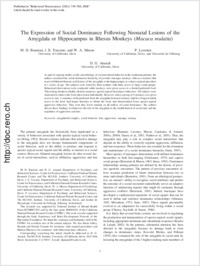The expression of social dominance following neonatal lesions of the amygdala or hippocampus in rhesus monkeys (Macaca mulatta)
- Bauman, M. D. Department of Psychiatry and Behavioral Sciences, Center for Neuroscience, California National Primate Research Center, Davis, CA, USA
- Toscano, J. E. Department of Psychiatry and Behavioral Sciences, Center for Neuroscience, California National Primate Research Center, Davis, CA, USA
- Mason, W. A. Department of Psychiatry and Behavioral Sciences, Center for Neuroscience, California National Primate Research Center, Davis, CA, USA
- Lavenex, Pierre Department of Psychiatry and Behavioral Sciences, Center for Neuroscience, California National Primate Research Center, Davis, CA, USA - Institute of Physiology, Department of Medicine, University of Fribourg, Switzerland
- Amaral, David G. Department of Psychiatry and Behavioral Sciences, Center for Neuroscience, California National Primate Research Center, Davis, CA, USA
-
2006
Published in:
- Behavioral Neuroscience. - 2006, vol. 120, no. 4, p. 749-760
English
As part of ongoing studies on the neurobiology of socioemotional behavior in the nonhuman primate, the authors examined the social dominance hierarchy of juvenile macaque monkeys (Macaca mulatta) that received bilateral ibotenic acid lesions of the amygdala or the hippocampus or a sham surgical procedure at 2 weeks of age. The subjects were reared by their mothers with daily access to large social groups. Behavioral observations were conducted while monkeys were given access to a limited preferred food. This testing situation reliably elicited numerous species-typical dominance behaviors. All subjects were motivated to retrieve the food when tested individually. However, when a group of 6 monkeys was given access to only 1 container of the preferred food, the amygdala-lesioned monkeys had less frequent initial access to the food, had longer latencies to obtain the food, and demonstrated fewer species-typical aggressive behaviors. They were thus lower ranking on all indices of social dominance. The authors discuss these findings in relation to the role of the amygdala in the establishment of social rank and the regulation of aggression and fear.
- Faculty
- Faculté des sciences et de médecine
- Department
- Département de Médecine
- Language
-
- English
- Classification
- Biological sciences
- License
- License undefined
- Identifiers
-
- RERO DOC 6372
- DOI 10.1037/0735-7044.120.4.749
- Persistent URL
- https://folia.unifr.ch/unifr/documents/300317
Statistics
Document views: 89
File downloads:
- lavenex_esd.pdf: 418
